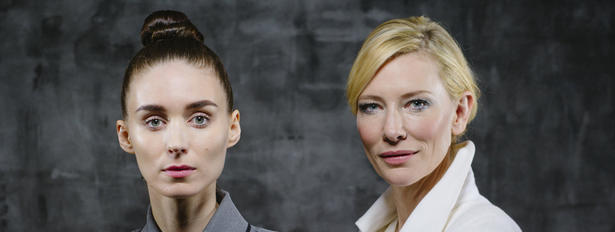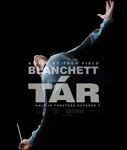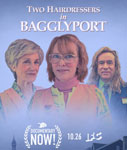
Not once salacious, Todd Haynes‘ Carol is a subtle and elegant telling of a romance between two women in the 1950s. Cate Blanchett is the title character and Rooney Mara is the young woman smitten by her. Their affair is brief but not without it’s repercussions.
Todd Haynes knows a little something about 1950s style from Far From Heaven and the mini-series, Mildred Pierce. He captures this era with incredible detail in everything from the costumes to set design to the color coming across on screen. Blanchett’s outfits are absolutely stunning and they convey the level of sophistication of her character.
As for cinematography, all I can say is, WOW. There are so many illusions to hiding and the Liz pointed out the use of windows is especially worth noting. It’s almost as if the film was shot for black and white, but it’s in color. The framing of each scene is focused, yet reveals so much of the story.
Now for the story. While I did appreciate the style, the story was really flat and underwhelming. There’s barely any idea of the affair being forbidden and no one seems to pretend it’s not what it clearly is. Perhaps it’s just hard to think of an affair between two women as an outlandish idea anymore. On one side, I really appreciated this about it, but on another, it really loses something by not illustrating how much of a big deal it was.
Blanchett melts into Carol, but I had a hard time with Rooney as the love interest. That deer-in-headlights look only goes so far. Kyle Chandler was impressive as Carol’s husband evoking a desperation that’s completely transparent.
It may not be the Oscar contender for Best Picture, but certainly could get a nomination for Costume Design.
via Reel News Daily
That obscure object of desire in “Carol”
Desire is a subject well-suited to cinema — the haunting stare, seductive voice and allure than draws in the object of affection, and us. As we see in Todd Haynes’ new film, “Carol” (which debuts today at the 53rd New York Film Festival), it is also the hard-to-define quality that can set rigidly-ordered lives tumbling.
In 1950s New York City, a department store shop girl, Therese (Rooney Mara), spies a woman, Carol (Cate Blanchett), looking for Christmas presents for her young daughter. You can almost hear the thunderclap as Therese remains riveted on the elegant, married beauty, unsure what the attraction is.
Carol is estranged from her husband, Harge (Kyle Chandler), who desperately wants to halt their ongoing divorce proceedings and just return to the life they had. But his desire for normalcy doesn’t fit with Carol’s determination not to live a lie, following the revelation of her lesbian affair with an old school friend, Abby (Sarah Paulson). But Carol is also wary that any appearance of “immorality,” such as an affair with a woman, might jeopardize maintaining custody of her daughter.Therese has a boyfriend, Tommy (Cory Michael Smith), who dotes on her and presses her to join him on a trip to Europe. Therese is one who generally goes along with the flow, because she’s never questioned what it means to do what others ask or expect of her. Indeed, while she might see herself as selfless, giving in to other’s demands, one character calls her out as being selfish — refraining from any decisions about what she wants, thus forcing others to direct her life for her.
Therese finds herself aching with thoughts of Carol, who suggests joining her on a road trip. She agrees, and their close-quarters travels enables an intimacy that marks a turning point in both their lives. Their trip also prompts Therese, perhaps for the first time, to make demands — to be selfish.
The film is adapted from the novel “The Price of Salt” by Patricia Highsmith, who based her story loosely on her own affair with a married socialite who lost custody of her child over allegations of lesbianism. Haynes (“Safe,” “Far From Heaven,” HBO’s “Mildred Pierce”) directs with great sensitivity and a sharp eye for period detail, making the viewer feel as trapped in the suffocating strictures of 1950s social mores as the characters.
Mara (who won the Best Actress Award at this year’s Cannes Film Festival for her performance) excels in her role of an aspiring photographer who lacks focus in her life, and who hopes that devotion to an older woman may fill that gap.Blanchett’s character — as straying wife, doting mother and confidante — reeks of stifled passion, stamped down by a judgmental society, but she is still resilient enough to lash out at threats to herself and her family. And in the face of accusations of immorality, Carol remains defiant, maintaining that hate and slander are ugly emotions and, she reasons, “We’re not ugly people.” Indeed, “Carol” shows that, then and now, dishonesty is the real ugliness.
via CBS News
 Welcome to Cate Blanchett Fan, your prime resource for all things Cate Blanchett. Here you'll find all the latest news, pictures and information. You may know the Academy Award Winner from movies such as Elizabeth, Blue Jasmine, Carol, The Aviator, Lord of The Rings, Thor: Ragnarok, among many others. We hope you enjoy your stay and have fun!
Welcome to Cate Blanchett Fan, your prime resource for all things Cate Blanchett. Here you'll find all the latest news, pictures and information. You may know the Academy Award Winner from movies such as Elizabeth, Blue Jasmine, Carol, The Aviator, Lord of The Rings, Thor: Ragnarok, among many others. We hope you enjoy your stay and have fun! 


 Black Bag (202?)
Black Bag (202?) Father Mother Brother Sister (2024)
Father Mother Brother Sister (2024) Disclaimer (2024)
Disclaimer (2024) Rumours (2024)
Rumours (2024) Borderlands (2024)
Borderlands (2024) The New Boy (2023)
The New Boy (2023) TÁR (2022)
TÁR (2022) Guillermo Del Toro’s Pinocchio (2022)
Guillermo Del Toro’s Pinocchio (2022) Documentary Now!: Two Hairdressers in Bagglyport (2022)
Documentary Now!: Two Hairdressers in Bagglyport (2022)












